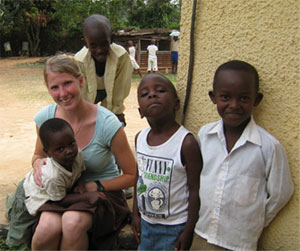 |
| Joanna Heathcote and children from Mburara International School. |
Last in a three-part series
When most people think of Africa, they think of poverty, HIV/AIDS and hunger.
After all, these are the images that we most frequently see on television.
SEE PHOTOS: Out of Africa
What are not as well publicized are the ongoing projects designed to tackle some of these major issues and the success stories. As our group traveled through East Africa, we met with many individuals who were confronting these severe problems. Some organizations focused on providing people with the means to improve their daily lives by teaching them new agriculture practices, supporting education and promoting entrepreneurship through trades and craftsmanship. It was in my second, and final, month in East Africa that I had the privilege of taking part in one of these success stories.
As the Field Studies Course drew to a close and our group of 15 students disbanded, I set off from the Ugandan capital, Kampala, to Mbarara, a major town four to five hours away by road. My professor had arranged for me to volunteer at Mburara International School, a small private primary school.
 |
| Joanna with students in her Grade 5 class. |
The school was founded by its principal, Mrs. Kanyangyeyo, a woman who was born and raised in Uganda, but received her university education in London, Ont. and then returned to her native country to pursue her dream of opening a primary school. The school has approximately 80 students, 50 of whom are boarders. They come from a wide range of backgrounds: some whose families are wealthy enough to afford the school fees while others are sponsored by private donors, many of them Canadian.
For four weeks I lived at this school sharing a bunk in the girls’ dorm. During the day, I taught physical geography to the Grade 5 class and served as a substitute for other teachers when needed. I coached girls’ soccer after school and baked with different classes on the weekends.
The children are fluent in English and are also learning Kiswahili and French in school. The basic curriculum is complemented by activities such as bi-weekly debates and quizzes in which the whole school participates. The students also have access to musical instruments, a television and computers which "Mrs. K" had acquired with help from her Canadian contacts. The education the children receive in this school far exceeds the standard in Uganda’s public school system where student-teacher ratio can be as high as 80-to-one.
Since returning from East Africa, I have been asked what kind of contribution I thought I made by volunteering at this school and if I would do it again. I am not sure I can adequately answer how the first question because in many ways this was just as much a learning experience for me as it was for the students at Mburara. Much of the education the students received from me did not actually occur in the classroom, but on the evenings and weekends we spent together. The children at Mburara are naturally curious and keen to learn, especially about the wider world which almost of all of them had only experienced through television. In the evening they would bombard me with questions: is Spiderman real? Do I know Mary-Kate and Ashley Olsen? They were fascinated by my varying skin tones, especially when I burned and peeled and they loved to play with my long hair since their heads are kept shaved most of the time.
There were certainly times when I felt overwhelmed. (In fact, I occasionally locked myself in the bathroom just to find a little peace) But at the end of the day, the moments shared with these children mean more to me than I can possibly describe on paper. I can only hope that I left as lasting an impression on them as they did on me.
Would I do it again? In a heartbeat.
From London, Ont., Joanna Heathcote is a varsity athlete and a student in the International Development Studies program.
